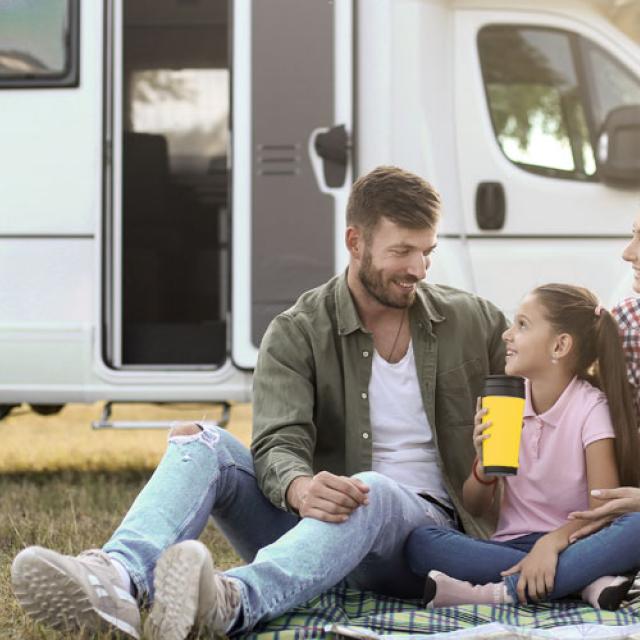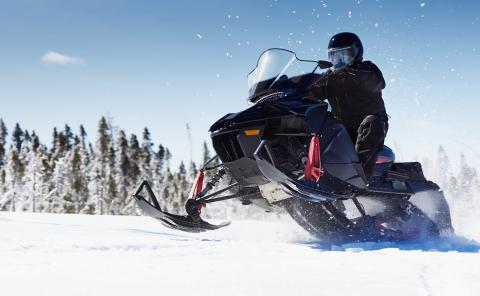Caravanning outside Québec

Do you have a Québec-registered RV and want to go spend a few months in the sun (maximum 6 months a year)? When you go caravanning outside the province, you have to be well prepared in order to keep you and everyone on the road with you safe. Make sure you know and follow the rules and regulations in the areas you’ll be visiting. The key to a successful trip is good planning.
Planning out-of-province trips
Always take the necessary precautions when travelling outside Québec. You’ll be bringing a lot of your belongings with you on the trip, so it’s important that everything goes well.
Avoiding potential problems
Travelling outside Québec in an RV is not a typical trip. Proper planning is crucial if you want to have a good time. Make sure you have everything you need before you leave so you can enjoy a worry-free vacation. If you’re well prepared, you’re less likely to run into unpleasant surprises. Proper preparation is important for two reasons.
First, if you’re used to travelling in Québec, keep in mind that traffic and installation rules and local laws and practices may differ from place to place. Reading up on them can be very helpful. Second, if you’re not used to travelling in a caravan, note that experience is key when driving an RV.
Get advice from other caravan enthusiasts
One safe way to get valuable experience is to seek out tips from other caravan enthusiasts. Read blogs, online articles, or specialized magazines—there’s all sorts of useful information out there. All it takes is a simple web search.
This will give you information on what to avoid and what’s unsafe, but also on what’s advisable and recommended. For example, if you want to spend some time in another country, you’ll be able to get tips on how to travel safely and affordably. Here are some tips to help you prepare for your trip.
Preparing for a short caravan trip outside Québec
Before you hit the road, there are a number of formalities to take care of. It’s important to get everything done before you leave, no matter how long you’ll be away. Even if you’re used to RV living, these precautions will help you throughout your travels and on your way back. Moreover, your insurer must be notified of any increase in risk. If you intend to go on a weeks-long RV trip, you need to let your representative know.
Reservations
A caravan is not a car—you can’t just park it wherever you want. Aside from your driveway, you can only park an RV in designated areas, such as campsites, which are very common and popular RV destinations.
You should always decide where you’re going before you set off so you can book a parking space. Campsites fill up quickly during peak periods, so reservations are a must. It would be a shame get stuck endlessly searching for a place to park in an unfamiliar area.
Route
Once you’ve booked a parking space, you need to determine the best route to get there. If you plan to do some sightseeing along the way, you should also consider all the places of interest and where you can stop for gas and rest. Whether you’re going on a long or short trip, it’s important to plan out your route. The insurance policy covers travel in Canada and the United States only.
Planning for alternative routes is also a good idea, as road work may force you to go a different way. Several apps can help you with this, or you can just use your GPS. Once you’ve clearly mapped out your route and stops, you can finally set a budget.
Budget
Your budget should take into account the round trip and your stay. For the trip, that means having enough money to keep the vehicle in good working order. Fuel costs and potential repairs should both be considered. For your stay, you should plan for the usual travel and vacation expenses.
The main thing to remember is that you should never go on a trip without enough money to deal with the unexpected. Just make sure you have the right kind of money. If you’re travelling abroad, you should convert your cash into the local currency and verify that your credit cards can actually be used outside the country.
Resting places in the U.S.
When visiting the United States, you’ll have to convert your currency into U.S. dollars. If you’re driving to Florida and you need a break, you can park in a department store or casino parking lot.
If you’re going to California, tourist sites are the best place to stop. All of these locations are safe and free of charge. But wherever you choose to stop and rest, you’ll need to make sure there’s actually room for you. Also, to prevent lawsuits, avoid wild camping and exhibitionism.
It’s important to make sure everyone travelling with you knows the rules of life in a trailer. Keep all vehicle papers and insurance documents with you. Trailer insurance is mandatory to protect your vehicle and personal belongings. Travellers should take out their own travel insurance to protect themselves because trailer insurance does not cover passengers residing in Québec.
Preparing for a long caravan trip outside Québec
All the formalities that apply to short caravan trips outside Québec also apply to longer trips, with some additions. You also need to:
- Make sure you have all the necessary documents and that they’re valid
- Check if you’re eligible for RAMQ health insurance
- Adjust your trailer insurance for long trips outside Québec
- Find RV garages
Documents
Persons over 15 years of age cannot leave the country without a passport. For example, a passport is required to travel to the United States by RV. For children 15 years of age and under, a citizenship card or a copy of the birth certificate is all you need.
Eligibility for health insurance
If you leave Québec for an extended period of time, you may lose certain benefits. For instance, to maintain your eligibility for the Québec health insurance plan, you must remain in the province for at least 183 days a year. To make sure that your specific situation is taken into account, you must inform RAMQ.
This will allow you to establish your eligibility for health insurance during an absence from Québec. RAMQ must receive this information before your trip. This may allow you to benefit from certain services that are covered outside Québec.
RV insurance
RV insurance is designed to protect you and all your belongings. It includes motor vehicle liability insurance and other protections to cover damage to your RV, e.g., in the event of a collision or theft. Travellers should consider coverage for vehicle repatriation costs (depending on the nature of the loss) and hotel expenses (in case their vehicle needs repairs following a covered loss).
While Québec law requires $50,000 in motor vehicle liability insurance, for an extended trip outside the province, you may have to increase the amount and get more coverage depending on the province or state you’re visiting. To determine if you’re covered or not, notify your insurer (representative) before going on your trip. That way you’ll know they have you covered.
RV garages
For a long trip, repair insurance is not enough. Since trailers are more complex to repair than cars, you’ll have to search in advance for all RV repair shops along the way and especially at your destination. Having this information will put your mind at ease—if anything happens, it’ll be taken care of.
Following these tips and the advice of caravan enthusiasts will help ensure that you have a good trip, no matter how much time you spend outside Québec. Your trailer insurance will make it easy to deal with any problems that may arise.




